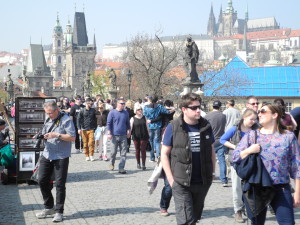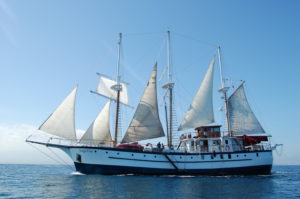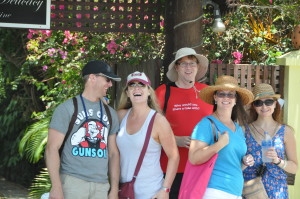
Prague’s famous Charles Bridge is often jam-packed with tourists. Photo by Clark Norton
You may have experienced it yourself when battling humongous lines to enter San Marco in Venice, the Uffizi Gallery in Florence, or the Sistine Chapel in the Vatican, or when you found yourself in a wave of fellow travelers struggling to get a peek at the changing of the guard at palaces in London, Athens, or Prague.
You may have been put off by hordes of drunken revelers in Amsterdam, Mallorca, or Berlin (of which, we trust, you were not one yourself).
You may have found small Alaskan ports or Croatian islands too overrun by your fellow cruise ship passengers to appreciate the beauty that attracted you to such cruise itineraries in the first place.
You may have sought out privacy in Iceland’s hot springs, only to find them packed with Game of Thrones fans drawn to the original home of “fire and ice.”
You may have discovered that that “authentic” floating market in Thailand that your guidebook waxes rhapsodic about has become little more than an op for selfies for other visitors jostling for angles to cut other selfie-takers out of their pictures.
You may have found that the crowds of tourists jamming into Kyoto’s fabulous temples and shrines have overwhelmed any sense of serenity they once enjoyed.
Overtourism: The Latest Buzzword
If you find yourself nodding in recognition of any or all of these situations, you’ve experienced the effects of “overtourism” — which has become the latest buzzword in the worldwide travel industry.
Overtourism is what happens when too many tourists spoil the spot. The numbers are striking : in 2017, travelers took 1.3 billion international trips. That’s more than 50 times the number taken in 1960, when jets ushered in the dawn of mass tourism.
Global tourism is now the world’s biggest industry, accounting for about one-tenth of global economic output. According to the UN World Tourism Organization, total global tourism spending amounted to $1.3 trillion in 2017 — $94 billion more than in 2016. More than 300 million people are employed worldwide in the industry.

Small ship cruises such as Island Windjammer’s Sagitta are less intrusive on already overrun destinations. Photo by Catharine Norton
While the economic benefits of mass tourism have been vital to many destinations (nearly 15 percent of Spain’s gross domestic product, for instance, stems from tourism), the most popular cities are feeling the crunch.
Last year, some 670 million people visited Europe alone. Venice, Barcelona, Amsterdam, Berlin, Paris, Rome, Prague, and other hotspots are being overrun by visitors who may just be loving them to death.
The new waves of tourists have been buoyed by the rise of cut-rate airlines and large cruise ships; alternative (and often cheaper) lodging options such as Airbnb and VRBO; the ease of booking flights, accommodations, and package tours via the internet; and the emergence of China, Russia, and the Arab world as potent new sources of world travelers.
There is also the increasingly expressed sentiment that mass tourism has brought a new, unsophisticated type of tourist to town — the type who drinks too much, is loud and unruly, who doesn’t appreciate the cultural and historic significance of the destination, who only interacts with other tourists, is obsessed with selfies, and spends money that mostly benefits a relatively few places that cater to the very same unsophisticated traveler.
The Loss of Authenticity
Critics point to the adverse effects overtourism can have on local populations.
Shops and other local businesses geared to serving tourists replace those that once served residents: bookstores give way to souvenir shops, bakeries are taken over by chain eateries, rental apartments once occupied by local families are now occupied by short-term visitors. Prices for housing and goods and services go up, forcing some to flee the cities altogether.

Airports are often stretched to the max these days. Photo by Tara Lee Tarkington on twitter.
Venice — considered the original poster child for overtourism — has seen its population drop to half of what it was a few decades ago.
All this means that the authentic experiences tourists are presumably looking for are fast disappearing — ironically due to their own ubiquitous presence. As the German publication Spiegel Online put it, “Tourists sit in traditional restaurants devoid of locals as they watch other tourists.”
Some residents are fighting back, trying to discourage the “tourist hordes.”
Banners and graffiti are popping up exhorting “Tourists go home,” while protesters in places like Mallorca, Barcelona, and Venice have taken extreme measures against tourists such as harassing them in cafes, slashing tour bus tires, and trying to block cruise ships from entering their ports.
What Some Destinations Are Doing
Harassing folks in souvenir T-shirts and slashing tires won’t solve anything. Inevtably, the tourist tsunami will only grow more intense in coming years.
Some destinations — such as Antarctica, the Galapagos islands, and the Inca Trail to Machu Picchu — have long imposed strict limits on the number of visitors, but those are impractical for most cities.
Still, fearing that their quality of life has diminished and their infrastructures are strained to the max, inundated communities have started to take some preventive measures.
- Dubrovnik, Croatia, population 42,000, whose old walled town is now besieged by 800,000 cruise ship passengers annually — as well as thousands of Game of Thrones fans seeking out locations where some of the series’ most dramatic scenes were shot– has been warned it may lose its UNESCO World Heritage status. In response, the municipal authorities are planning to limit the number of visitors to 8,000 a day — still a very large wave.
- Venice has banned huge cruise ships from docking near the city center
- Barcelona has placed a moratorium on new hotels, and Paris, Berlin, Palma de Mallorca, and Amsterdam have placed limits on Airbnb and other rental apartment approvals. (It’s worth noting, though, that from a tourist’s standpoint staying at a neighborhood Airbnb can offer a more authentic experience than staying at a hotel.)
- Amsterdam, with a population of 850,000 and 18 million annual visitors, has also banned new hotel construction and diverted cruise ships from the city center, and has even banned new shops and eateries that cater almost exclusively to tourists, such as souvenir shops and crepes stands. The city has also instituted heavy fines for drinking alcohol on the streets and drunken behavior, collectible on the spot, and is heavily monitoring the red light district.
Tourism boards and travel agencies — which can play a vital role by redirecting travelers to lesser known but still desirable locations in their region — are starting to take notice; overtourism is the subject of several upcoming conferences.

If you’re taking a tour, look for companies that limit group size. Photo by Amy El-Bassioni.
What We Can Do
As a travel writer who encourages baby boomers to see the world, I’m the last person to tell anyone not to go to destinations like Venice, Amsterdam, Dubrovnik, Barcelona, or Kyoto, all of which are among my favorite places in the world.
But if you’re concerned about the effects of overtourism, here are a few suggestions of what you (and I) can do to practice more responsible, sustainable tourism:
- Travel to less-trammelled locations. And yes, that may mean avoiding travel magazines’ lists of “Hot Places to Go This Year” and “The World’s Best Beaches,” as well as Trip Advisor favorites.
- If you do find yourself in a Venice or an Amsterdam, seek out off the beaten track neighborhoods and patronize shops and restaurants that may not see much tourist cash.
- Travel in the off-seasons, which means avoiding Europe in the summer. You’ll likely save money, too.
- Take small-ship and river cruises rather than giant cruise ships that disgorge thousands of passengers daily on cities and towns that aren’t equipped to handle them.
- If you take tours, choose companies that limit group sizes, take you to locally owned accommodations and restaurants, and give back to the communities they visit in some way. (Stride Travel is an excellent online source of such tours.)
- Consider voluntourism or joining educational tours where you can really dig into the local culture (sometimes literally, if it’s an archeological tour).
The bottom line: Keep traveling but try to avoid being an “overtourist.” The locals will thank you — and you’ll probably have a more enjoyable vacation as well.












11 Responses to Overtourism: The New Travel Plague?